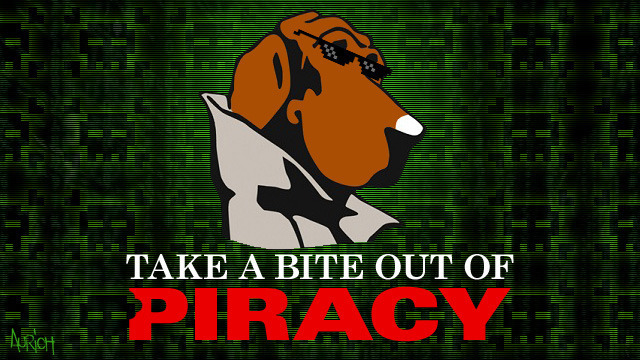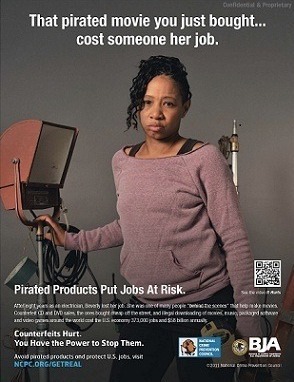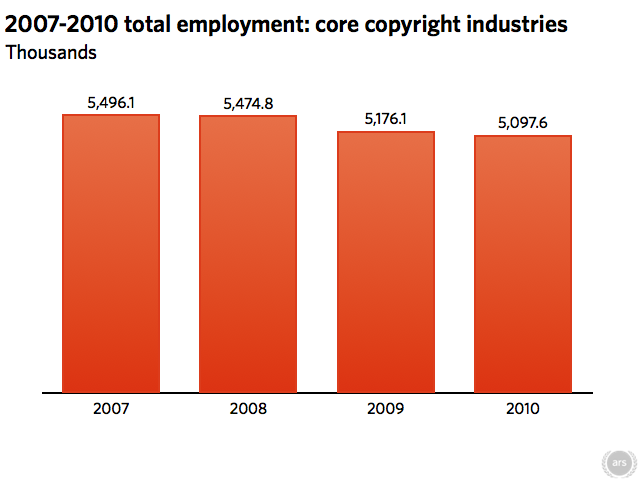
No less an official than US Attorney General Eric Holder rolled out yesterday's new government-backed public relations war on piracy.
"In just a few moments, we'll be unveiling a series of television, radio, and Internet messages designed to help get the word out about the dangers of buying counterfeit goods, and the seriousness of intellectual property theft," he said at the press conference.
Holder seemed proud of the new push to educate Americans about the perils of Internet downloads and online prescriptions, and why not? His briefing on the plan probably made it all sound hip and informative. Then came the actually video. "Lurid" doesn't begin to describe the one-minute spot, which begins with two teenagers looking at a pirated DVD on the street and then moves in whiplash-inducing fashion to drugs, gang violence, child labor, and thugs sitting around looking generally evil and counting their phat loot. The video does for "piracy" what "reefer madness" and "hairy palms" did for an older generation's social ills.
As you watch the video below, remember: your tax dollars helped pay for this.
The whole campaign is run by the National Crime Prevention Council (NCPC), the group responsible for McGruff the Crime Dog. McGruff, the "take a bite out of crime" super-sleuth, is recognized by 49 percent of younger adults and teens, says NCPC, which plans to make McGruff "a valuable asset in educating people about intellectual property theft." The White House, the Department of Justice, and Immigrations & Customs Enforcement are all onboard.

All of which would lead us to hope that the claims made here have some connection to reality. Fortunately, the ills of piracy have been toned down a bit from 2008, when US Attorney General Michael Mukasey linked piracy to terrorism. In 2005, the MPAA's director of anti-piracy operations linked film piracy to "business-minded thugs who fund this activity through money raised from other illicit activity such as drug dealing, gun running, and human trafficking (utilizing the same distribution networks), and who, in turn, fund these other activities through the money they raise through piracy."
Today, the claims are a bit more modest and focus more on lost jobs than on terrorism and human trafficking, but officials still insist that piracy funds widespread gang and criminal activity. Today's claim may be true, since the new campaign covers all manner of counterfeit clothes, shoes, and drugs in addition to online and DVD piracy. But, as the video above shows, the differences between those forms of counterfeiting are routinely elided—and the differences matter.
Most research on piracy comes from interested parties, but the best academic, worldwide look at the issue comes from major report Media Piracy in Emerging Economies, a 400+ page book that took three years and 35 researchers to write. Their conclusion on this issue is worth quoting at length:
We found no evidence of systematic links between media piracy and more serious forms of organized crime, much less terrorism, in any of our country studies.
What explains this result? Invariably, the rationale offered for criminal-syndicate and terrorist involvement is that piracy is a highly profitable business. The RAND report, for example, states (without explanation) that “DVD piracy... has a higher profit margin than narcotics”—an implausible claim that has circulated in industry literature since at least 2004.
We think the record is clear that piracy was a highly profitable business through the early 2000s, when optical disc production facilities were expensive, industrial in scale, and relatively scarce... We see no evidence that piracy, outside a few niche markets, is still a high-margin business.
Increasingly, commercial pirates face the same dilemma as the legal industry: how to compete with free. This decline in costs is, in our view, the primary factor shaping pirate markets and a growing disincentive for traditional organized-criminal involvement. Yet, to the best of our knowledge, no industry or law enforcement statements about alleged criminal connections have thought this worth mention. As in other contexts, the issue is avoided by conflating piracy and counterfeiting under the rubric of what Interpol calls "IP crimes."
The print campaign features five different ads, each focusing on a specific form of piracy or counterfeiting. The one focused on movies stresses the job loss aspect over the "scary gangster in an SUV" approach, but even this claim is overblown. As the major copyright industries revealed in a recent report, they pay better than most American jobs, are outperforming the economy, and are selling record amount of product overseas. As for employment, it has fallen just mildly during the worst economic slump in 80 years.

Piracy and counterfeiting can be serious problems that conceal real social ills behind the facade of cheap goods, but when it comes to media piracy, at least, too many campaigns rely on scare tactics and bad statistics.
Update: A reader e-mails to ask about the analysis of the copyright industry job numbers, noting that the core copyright industries have lost about 8 percent of its jobs over the last few years while the overall US economy has seen a 5 percent decrease in the number of employed citizens. Hasn't it been hit hard by piracy after all?
My point isn't that there have been of job losses in copyright, but that the "epidemic" that would lead to this sort of specific campaign isn't on display here. If copyright industries lost 8 percent of their workforce while the rest of the country lost 5 percent, and we divide those additional losses over 4 years, it's been a slow and quite modest decline—and it comes as the industry says it's beating the overall economy in growth. Piracy might well account for some of this decline, or piracy might be holding the industry back from hiring far more people than it does now—it's notoriously hard to know—but the industry's own data on jobs doesn't suggest the massive hemorrhaging of jobs that might justify the rhetoric or the solutions usually trotted out.
Listing image by Photo illustration by Aurich Lawson
reader comments
173